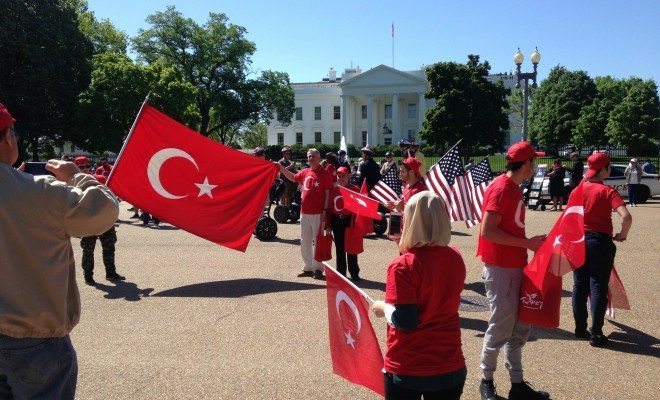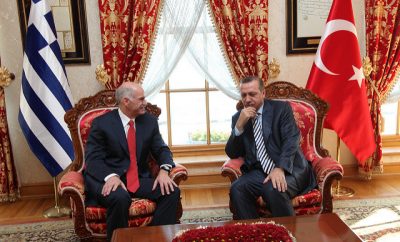 "Peace and Solidarity Walk" courtesy of [Alec Siegel for Law Street Media]
"Peace and Solidarity Walk" courtesy of [Alec Siegel for Law Street Media]
News
Turkish-Americans Rally Behind Turkey in D.C.’s ‘Peace and Solidarity Walk’
Under an endless blue sky and a blazing white sun, Washington D.C.’s Lafayette Square was awash in crimson on Sunday afternoon. Turkish and American flags danced in the wind; hundreds of flag bearers milled about in red hats, tee shirts and bags, most of which were stamped with the moon and star insignia of the Republic of Turkey.
As hordes of people poured out of coach buses and into the square, which abuts the White House’s North Lawn, Turkic and Arabic blared through foghorns, announcing free sandwiches and soda. A cluster of young girls in hijabs (traditional Muslim headscarves) handed out Turkish chocolate bars and juice boxes.
The Peace and Solidarity Walk was about to begin. Hundreds of people would spend the next few hours chanting, singing, and dancing their way to the Turkish Embassy in support of their motherland and its leader, President Recep Tayyip Erdogan. Organized by the Turkish American National Steering Committee, or TASC, event flyers and brochures pegged the rally as a symbol of support behind Turkey in fighting “Islamophobia,” “terrorism and extremism,” and “Syria’s brutal regime.”
![Children and their parents draped in red walk from the White House to the Turkish Embassy. [Image Courtesy of Alec Siegel Via Law Street Media]](http://lawstreetmedia.com/wp-content/uploads/IMG_3340-700x525.jpg)
Children and their parents draped in red walk from the White House to the Turkish Embassy. [Image courtesy of Alec Siegel for Law Street Media]
But interviews with a number of participants hinted at perhaps an underlying motive: a response to recent protests by Armenians in Washington and Turkey.
“Armenian people are making protests against the Turkish government making accusations about the [1915 genocide],” said Berk Usal, a TASC staff member and English language exchange student from Turkey. “We are making a reaction to show we are with our nation, with our state.”
Though the facts are hazy, the international community officially recognizes the grisly events of April 1915 as a genocide. Armenians say 1.5 million of their people were slaughtered under Ottoman rule, though Turkey argues it was simply a consequence of a civil war, pointing out that thousands of Turks were killed as well.
“We fight [Armenia] a long time,” explained Sait Unay, who came with his mosque from Brooklyn to stand behind his motherland. Wearing a sweat-soaked hat, he sat under the shade of a tree, watching as the red mass of people and cars–one with a Turkish flag paint job–streaked by. His rocky English brought him to the crux of his reason for making the four-hour journey from Brooklyn:
“We are protesting Armenia.”
But overall, the rally was a joyous affair, and whatever their reasons for being there, the marching Turkish-Americans sang songs and engaged in coordinated chants as they curled around DuPont Circle, the home stretch of Embassy Row.
A kid in a karate uniform (he was an orange belt) held a sign that read, “Peace at home, peace in the world.”
The untamable red blob clogged 17th street, past the Smithsonian’s Renwick Gallery, as countless baffled tourists captured video of the rally on their phones. (Overheard: “Isn’t that the Soviet Union flag?”). At one point, a convoy of cars honked, as drivers and passengers waved miniature Turkish flags out their windows.
![A true Turkish patriot. [Image Courtesy of Alec Siegel Via Law Street Media]](http://lawstreetmedia.com/wp-content/uploads/IMG_3373-700x525.jpg)
A true Turkish patriot. [Image courtesy of Alec Siegel for Law Street Media]
As a buffer zone between the tumultuous Middle East and the crumbling stability of Western Europe, the former Ottoman state needs all the support it can get. Refugees fleeing war-torn villages and the brutal Assad regime in Syria, as well as those fleeing violence in Iraq and Afghanistan, favored the path through Turkey to reach ports in the Greek islands, particularly Lesbos.
That route–often tumultuous and deadly–saw thousands of people each month pack into boats in an attempt to cross the Mediterranean Sea en route to Germany, their ultimate destination. But a pact between Turkey and the E.U. re-routed most migrants to journey through Libya and Italy instead. Spearheaded by Germany’s Chancellor Angela Merkel, Turkey is required to take back migrants who reach Greece after the deal went into place on March 20. Those who had reached Greece before that date would be dealt with on a case by case basis. In exchange for housing nearly 2.7 million refugees, Turkey has demanded visa-free travel for its citizens.
There was little obvious resistance to the passionate mass of Turkey supporters, but standing by a bronze statue of Mustafa Kemal Atatürk--who in 1923 founded the Republic of Turkey—Hudai Yavalar was shaking his head.
“Most of [the rally participants] are government-sponsored,” said Yavalar, chairman of the Atatürk Society of America, a non-partisan organization dedicated to preserving the ideals of the father of modern Turkey (Atatürk: “father of Turks”). “[Erdogan] wants to show America ‘we are strong.'”
The rally saw mosques from around the country–Chicago, Brooklyn, New Jersey–bus over their members to participate. Yavalar was suspicious of their motives for being there.
As the rally raged, Yavalar camped out next to the statue of Atatürk, protecting the red and white petunias and Mediterranean Pinks encircling it. Spillovers from the rally would pop up every now and then to have their photo taken with the sculpted father of the Turkish state.
![Surrounded by Hudai Yavalar's flowers: a statue of the founder of Turkey, Mustafa Kemal Atatürk. [Image Courtesy of Alec Siegel Via Law Street Media]](http://lawstreetmedia.com/wp-content/uploads/IMG_3366-700x525.jpg)
Encircled by Hudai Yavalar’s flowers: a statue of the founder of Turkey, Mustafa Kemal Atatürk. [Image courtesy of Alec Siegel for Law Street Media]
“Don’t step on the flowers!” Yavalar cautioned the eager cloisters of friends or families, alternating between English and Turkic, his native tongue.
A woman wearing a hijab and clutching a Turkish flag barely dipped her toe in the soil. Yavalar was on high alert.
“Ma’am please,” he pleaded, “I came here just to defend the flowers.”
Born and raised as a Muslim in Turkey, Yavalar has since distanced himself from the religion and from the country he says he hardly recognizes anymore.
“[Turkey] is not the way it used to be,” he said, railing against a state he sees as secular in name only. “They are Islamists.” In between nervous glances at his flower garden, Yavalar said that Turkey’s recent actions, namely the jailing of Turkish and foreign journalists, is bringing it back “to the Middle Ages.”
A few blocks away, two giant Turkish flags adorned the front gate of the Turkish Embassy, the finish line of the rally. Police officers stationed at the Embassy of Japan across the street watched as the usually tranquil Embassy Row turned raucous.
The chief rallying cry could probably be heard from Capitol Hill: “We support Turkey! We support America! We support peace!”








Comments